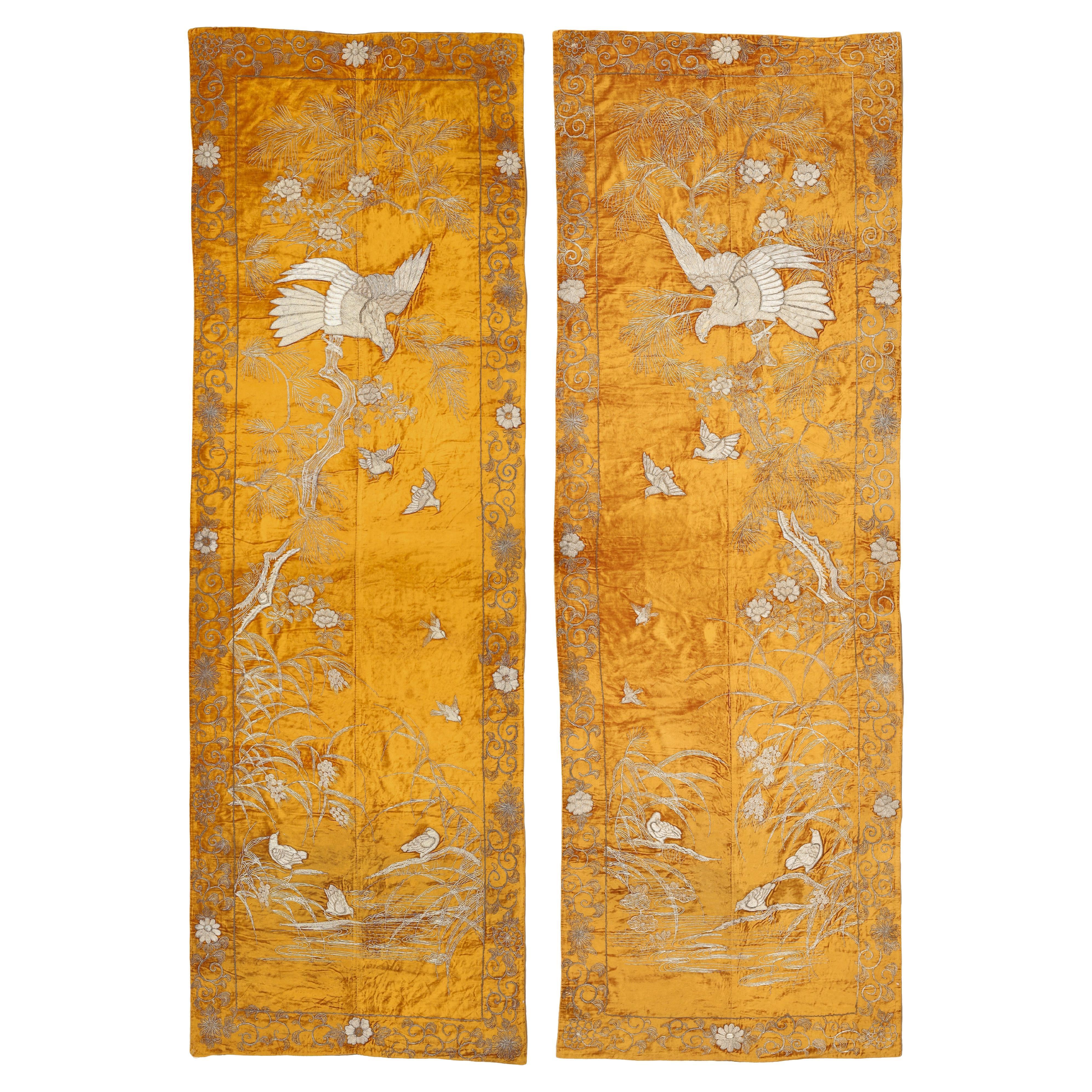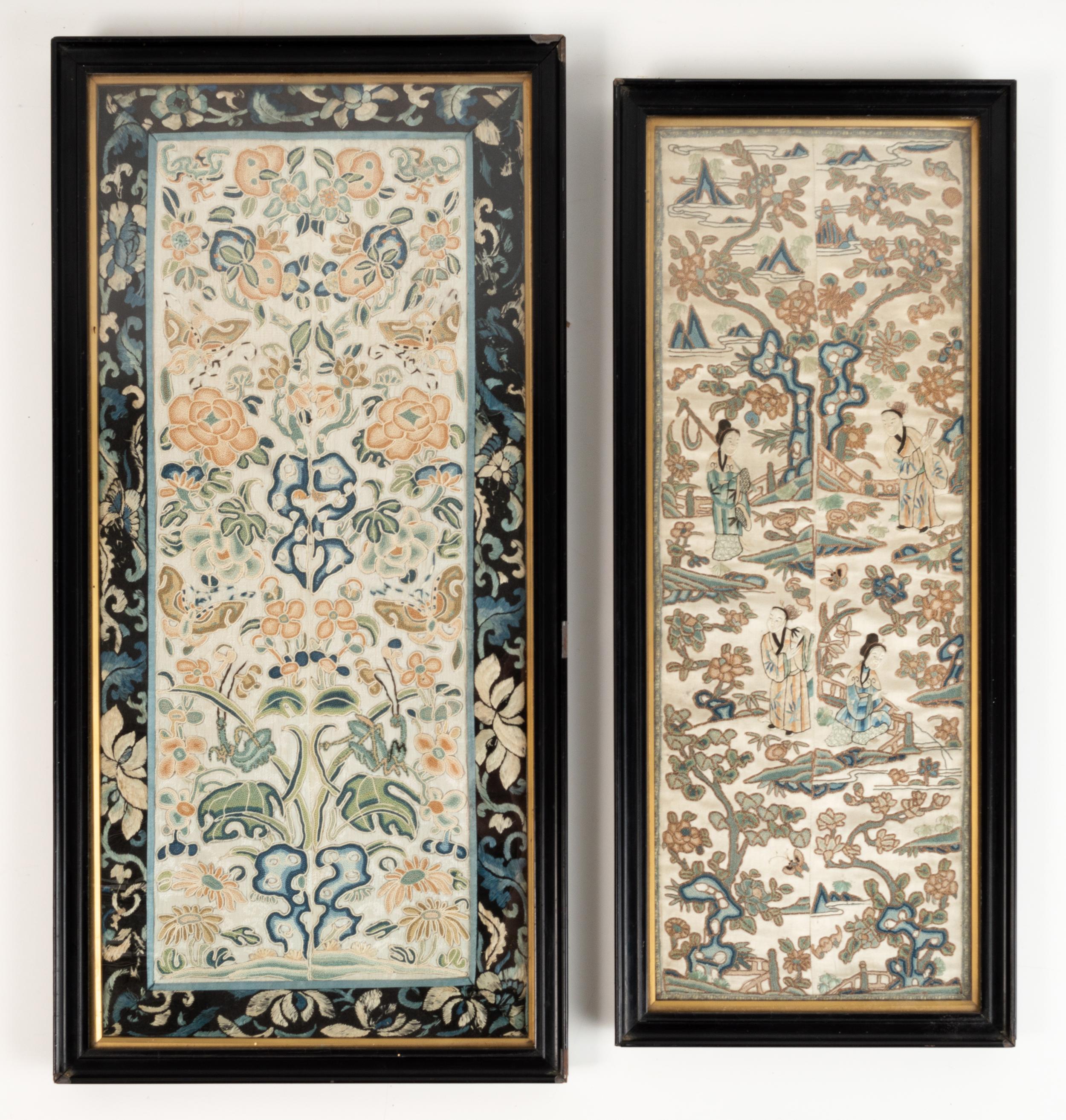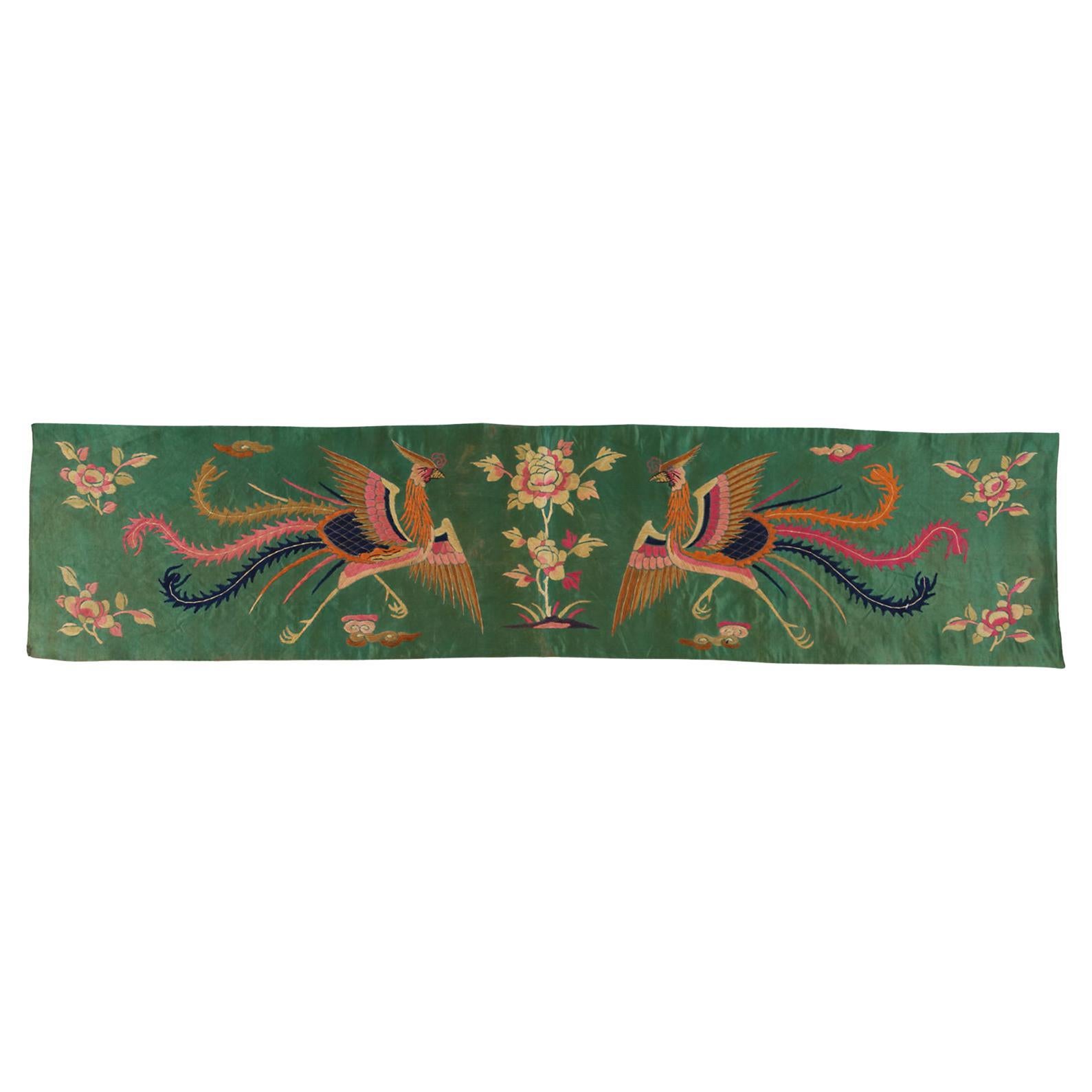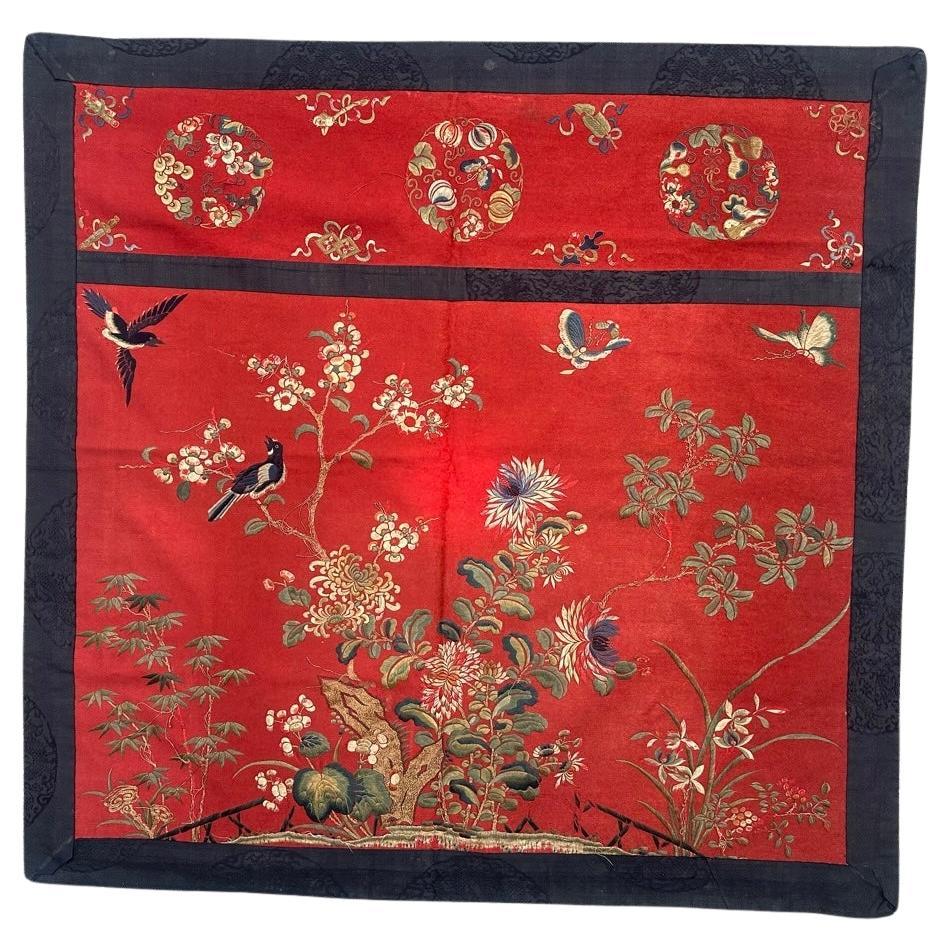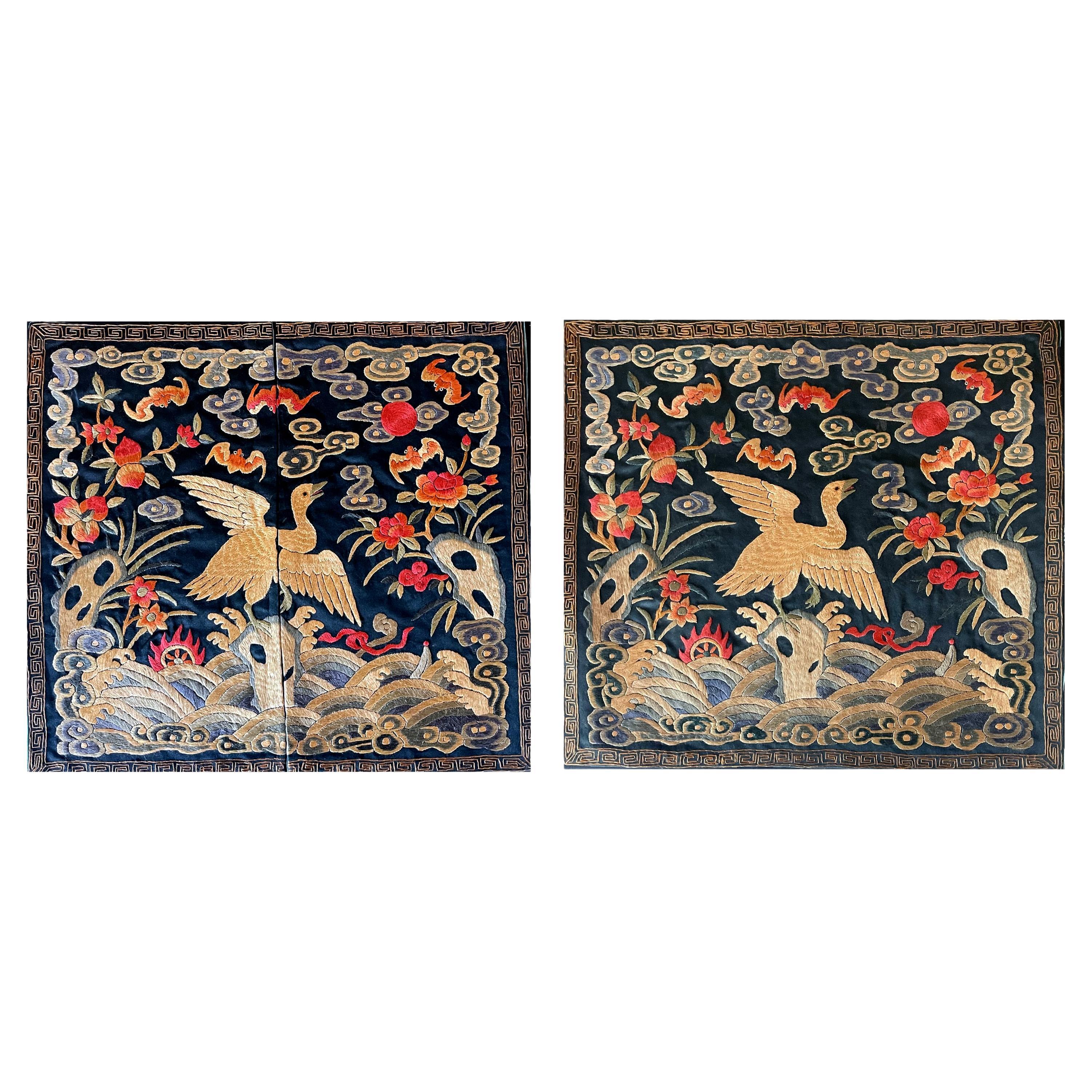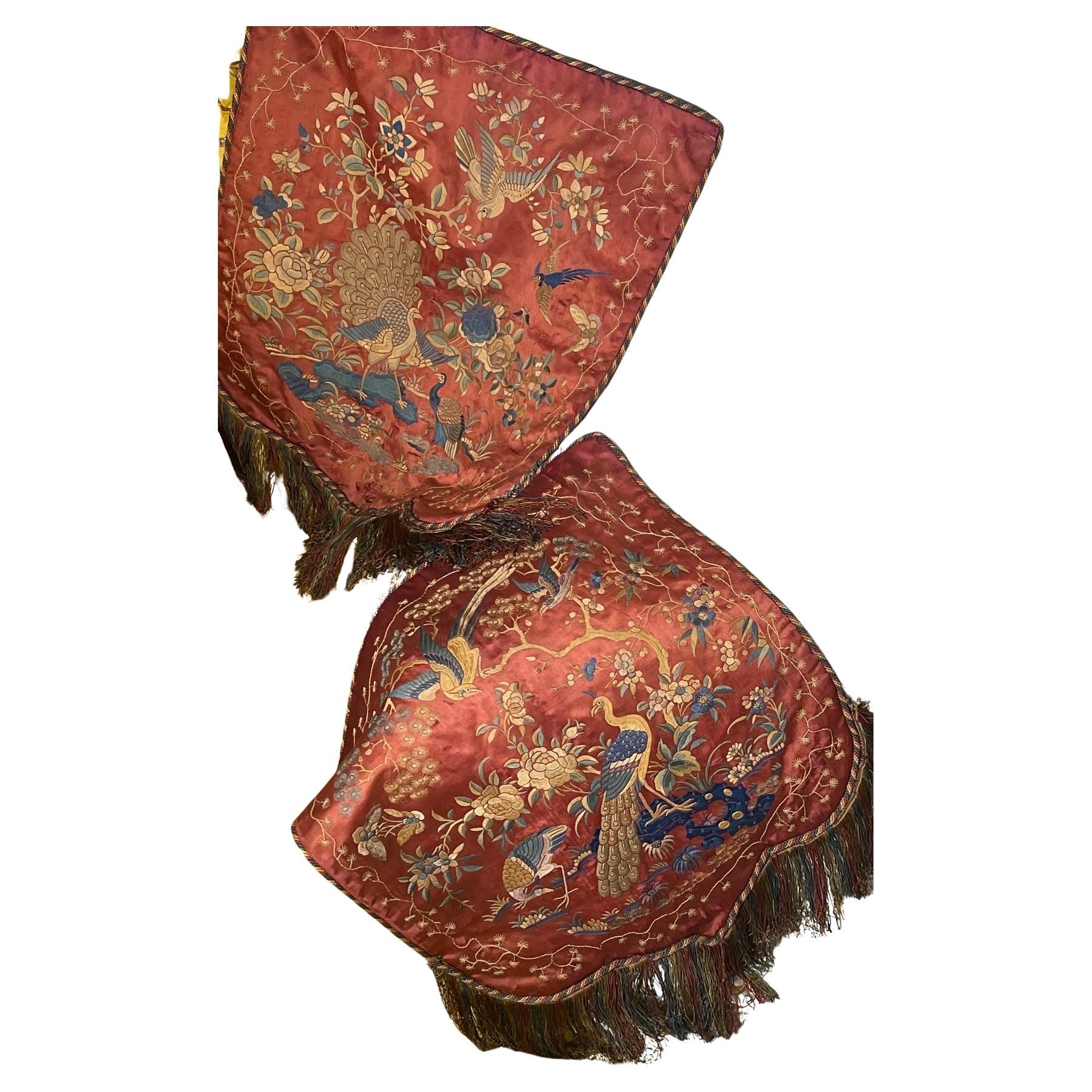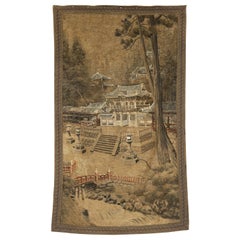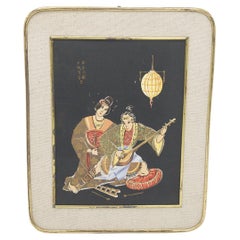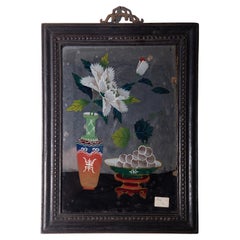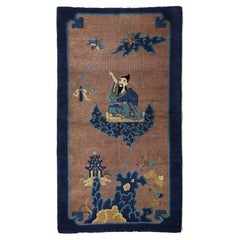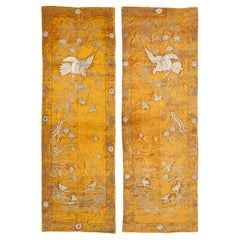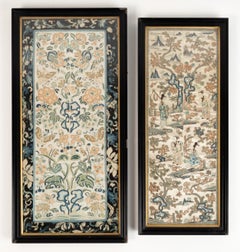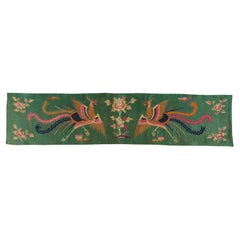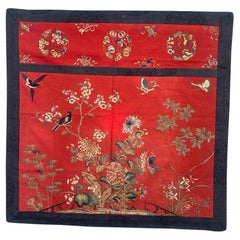Items Similar to Pair of Silk Blankets or Embroideries, Qing Dynasty
Want more images or videos?
Request additional images or videos from the seller
1 of 12
Pair of Silk Blankets or Embroideries, Qing Dynasty
$3,537.92per set
£2,648.22per set
€3,000per set
CA$4,869.19per set
A$5,427.22per set
CHF 2,847.48per set
MX$66,275.22per set
NOK 36,055.25per set
SEK 34,077.69per set
DKK 22,838.11per set
About the Item
This spectacular pair of silk fabrics, dating back to the 19th-century Qing dynasty, is a precious example of the ancient Chinese art of embroidery. The fabrics are adorned with embroidered patterns, likely created with multicolored threads, adding depth and vibrancy to the designs. These silk tapestries can be used as decorative blankets or as home décor pieces to enrich spaces with an oriental flair. Among the central figures in the embroidery is the Fenghuang, the iconic Chinese phoenix. According to Chinese mythology, this colorful bird, three meters long, is known for its melodious song, which can enchant anyone lucky enough to hear it. The Fenghuang symbolizes prosperity, good fortune, and new beginnings, and its presence on these fabrics enhances their symbolic and spiritual significance, making them ideal for those seeking pieces that convey positive and regenerative values.
In addition to the Fenghuang, the embroidered lotus flowers symbolize purity and spiritual growth. In Taoism, a philosophy deeply rooted in Chinese culture, the lotus flower is considered sacred. It represents detachment from the material world and spiritual elevation, values that guide practitioners along the Taoist path. In this context, the lotus not only represents beauty and harmony but also invites inner reflection.
The fabric used for these embroideries is a dark orange silk, a warm and rich tone that enhances the elegance of the multicolored embroidery. Despite some flaws and tears due to age, the intrinsic beauty of these tapestries remains unmatched. The quality of the silk and the precision of the embroidery showcase the craftsmanship of the time and add unique historical and artistic value to these pieces.
Ideal as Tapestries or Home Décor
These fabrics are perfect for use as decorative tapestries or as home décor in oriental-style settings, or to add an exotic touch of elegance to any space. Thanks to their strong symbolic value and the refinement of the embroidered motifs, they can transform any room, creating an atmosphere of refinement and spirituality.
- Dimensions:Height: 100.4 in (255 cm)Width: 32.68 in (83 cm)Depth: 0.4 in (1 cm)
- Sold As:Set of 2
- Style:Chinoiserie (Of the Period)
- Materials and Techniques:
- Place of Origin:
- Period:
- Date of Manufacture:1800
- Condition:Wear consistent with age and use. Minor structural damages. In original condition of the period , flaws and shortcomings.
- Seller Location:Milano, IT
- Reference Number:1stDibs: LU4911241355372
About the Seller
4.8
Platinum Seller
Premium sellers with a 4.7+ rating and 24-hour response times
Established in 2010
1stDibs seller since 2019
408 sales on 1stDibs
Typical response time: 6 hours
- ShippingRetrieving quote...Shipping from: milano, Italy
- Return Policy
Authenticity Guarantee
In the unlikely event there’s an issue with an item’s authenticity, contact us within 1 year for a full refund. DetailsMoney-Back Guarantee
If your item is not as described, is damaged in transit, or does not arrive, contact us within 7 days for a full refund. Details24-Hour Cancellation
You have a 24-hour grace period in which to reconsider your purchase, with no questions asked.Vetted Professional Sellers
Our world-class sellers must adhere to strict standards for service and quality, maintaining the integrity of our listings.Price-Match Guarantee
If you find that a seller listed the same item for a lower price elsewhere, we’ll match it.Trusted Global Delivery
Our best-in-class carrier network provides specialized shipping options worldwide, including custom delivery.More From This Seller
View AllJapanese Antique Silk and Cotton Tapestry
Located in Milano, IT
Wonderful and very rare Japanese tapestry made in the 1900s, made of woven silk and cotton, of absolute fineness.
The tapestry is developed in length ...
Category
Antique Early 1800s Japanese Japonisme Decorative Art
Materials
Fabric, Silk
$2,653 Sale Price
25% Off
Antique Japanese Brass Painting 'Romantic Serenade'
Located in Milano, IT
Ancient and very rare Japanese painting made in the early 1900s of fine Japanese manufacture. The painting has a rectangular brass frame, with rounded corners. Internally we see an a...
Category
Antique Early 1900s Japanese Anglo-Japanese Paintings and Screens
Materials
Brass
$377 Sale Price
20% Off
Antique Chinese reverse glass painting
Located in Milano, IT
Fascinating 19th-century Chinese mirror painting depicting traditional Chinese interiors with flowers in vases placed on wooden stands, bonsai trees in ceramic planters, books, and ...
Category
Antique 1890s Chinese Chinese Chippendale Paintings and Screens
Materials
Mirror, Wood
Late Ming c.a Antique Carpet with emperor on clouds
Located in Milano, IT
Behold, a magnificent antique carpet from the late Ming Dynasty period, a true testament to the artistry and craftsmanship of ancient China. Crafted from the finest wool and meticulo...
Category
Antique Early 1700s Chinese Ming Chinese and East Asian Rugs
Materials
Wool
Darya antique wool rug from Pamir
Located in Milano, IT
The Darya rug from the Pamir is a refined example of textile craftsmanship from the enchanting and remote mountainous regions of the Pamir, often called the "Roof of the World." Made...
Category
Antique Early 1900s Chinese Chinoiserie Central Asian Rugs
Materials
Wool, Cotton
Antique Chinese reverse glass painting with flowers and butterflies
Located in Milano, IT
Fascinating 19th-century Chinese mirror painting depicting traditional Chinese interiors with flowers in vases placed on wooden stands, bonsai trees in ceramic planters, books, and o...
Category
Antique Late 18th Century Chinese Chinese Chippendale Paintings and Screens
Materials
Mirror, Wood
You May Also Like
Rare Pair of Japanese Meiji Period Silver Thread Embroideries on Silk Velvet
Located in Milan, IT
A rare and exquisite pair of antique Japanese embroideries woven during the Meiji period (1868-1912), at a time when the Japanese arts and crafts had been discovered by a selected fe...
Category
Antique 1870s Japanese Meiji Textiles
Materials
Silver Leaf
Pair of 19th Century Chinese Textile Qing Dynasty Embroidered Sleeve Panels
Located in London, GB
A Pair Of Chinese Embroidered Sleeve Panels.
China, 19th Century, Qing Dynasty.
Antique textile ff rectangular form, with a central seam, one decora...
Category
Antique 19th Century Chinese Qing Textiles
Materials
Silk
Antique Chinese Silk Textile, ca. 1880
Located in Ferrara, IT
This is an antique Chinese silk textile woven during the end of the 19th century circa 1880 and measures 141x 33CM in size. the design of this tex...
Category
Antique 1880s Chinese Other Textiles
Materials
Silk
Beautiful antique wool and metal Chinese Embroidery
Located in Saint Ouen, FR
Nice antique Chinese embroidery with beautiful design with flowers, birds and butterflies, and with nice natural colours with a red background, entirely hand embroidered with silk, w...
Category
Antique Late 19th Century Chinese Chinoiserie Tapestries
Materials
Metal
$1,471 Sale Price
20% Off
Pair Chinese Embroidered Fourth Rank Badges Qing Dynasty
Located in Atlanta, GA
A fine matching pair of embroidered silk civil rank badge panels (known in Chinese as Buzi) unframed. The panels feature borders of fret archaic key a...
Category
Antique Mid-19th Century Chinese Qing Textiles
Materials
Silk, Giltwood
Antique Embroidered Silk Banners PAIR
By Aubusson Manufacture
Located in Canterbury, GB
A pair of Antique Chinese Silk Banners
Skillfully embroidered with Birds and Prunus Blossom
Edged with antique cording, finished on bottom edge with very fine quality Chinese silk tassel...
Category
Antique 19th Century Chinese Chinese Export Textiles
Materials
Silk
More Ways To Browse
Antique Silk
Colorful Textile
Silk On Silk Embroidery
Silk Embroidery Art
Antique Silk Fabric Silk
Antique Silk Fabric
Central Asian Embroidery
Dynasty Silk
Bird Silk Art
Antique Central Asian Textiles
Antique Silk Embroidery Art
Chinese Song Dynasty
Song Dynasty Furniture
Orange Chinoiserie
Asian Silk Art Birds
Chinese Taoist
Taoist Art
Silk Embroidered Blanket
